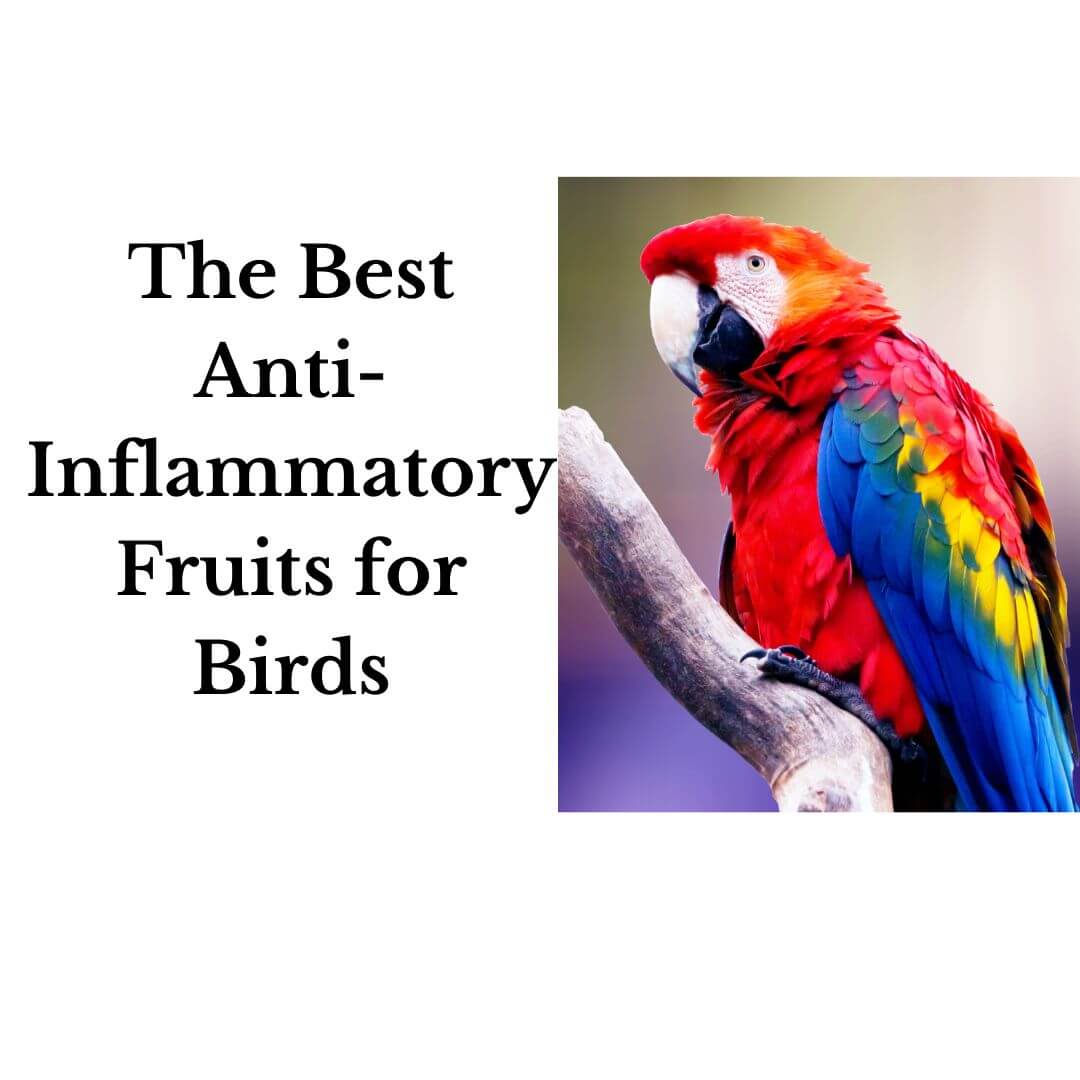
The Best Anti-Inflammatory Fruits for Birds: A Guide to Healthier Birds and Longevity
Share
Inflammation is a natural response by the body to fight infection, heal injuries, and ward off disease. However, chronic inflammation can lead to health issues over time. In birds, just like in humans, inflammation can manifest in various ways, including joint discomfort, skin conditions, and a weakened immune system. Fortunately, nature provides a solution in the form of anti-inflammatory fruits, many of which can be safely included in your feathered companion’s diet.
This article explores some of the best anti-inflammatory fruits for birds, detailing their benefits, how to serve them, and the science behind their healing properties.

The Role of Anti-Inflammatory Foods in a Bird’s Diet
Birds in the wild naturally consume a variety of fruits, seeds, and vegetation that help balance their dietary needs. Foraging in diverse ecosystems allows them to access nutrients that combat inflammation and promote overall well-being. For captive birds, replicating this natural diet is essential for preventing inflammation caused by processed foods, obesity, or insufficient nutrients.
Incorporating anti-inflammatory fruits into their meals can:
- Boost immune function through antioxidants and vitamins.
- Support healthy joints and feathers with natural phytonutrients.
- Aid in digestion while reducing inflammation in the gut.
- Promote vibrant plumage by reducing oxidative stress.
Let’s take a closer look at the top anti-inflammatory fruits for birds.
What are the best anti-inflammatory fruits for Birds?
Berries: Tiny Powerhouses of Healing
Berries are among the most potent anti-inflammatory fruits, packed with antioxidants, fiber, and vitamins. Their low sugar content makes them ideal for parrots and other avian species.
-
Blueberries: Rich in anthocyanins, which reduce inflammation and protect cells from oxidative damage. These small fruits are easy to serve and can be given fresh or slightly mashed for smaller birds.
-
Strawberries: Containing ellagic acid, strawberries help reduce inflammation and support the immune system. Always remove the tops, as these can be harder for birds to digest.
-
Raspberries and Blackberries: Loaded with fiber and Vitamin C, they help regulate digestion while offering anti-inflammatory benefits.
How to Serve: Wash thoroughly and offer whole, sliced, or mixed into a fruit salad.
Pomegranates: Nature’s Jewel
Pomegranates are a superfood for birds, thanks to their high concentration of polyphenols, which are known for their anti-inflammatory and antioxidant properties. The seeds, or arils, are particularly nutrient-rich and loved by many birds.
-
Anti-inflammatory Benefits: Pomegranates have been shown to reduce markers of inflammation, particularly in the digestive system.
-
Fun to Forage: The act of picking out the seeds is also a natural foraging activity, stimulating your bird mentally and physically.
How to Serve: Offer the seeds fresh, or place a small cluster inside a foraging toy to encourage enrichment.
Apples: A Crisp Source of Healing
Apples are packed with quercetin, a flavonoid known for its strong anti-inflammatory and immune-boosting properties.
-
Anti-inflammatory Benefits: Quercetin reduces inflammation in the respiratory tract, making it especially beneficial for birds prone to air sac or respiratory issues.
-
Digestive Health: The natural fiber in apples aids in maintaining a healthy gut.
How to Serve: Slice thinly or chop into small pieces for easy consumption.
Citrus Fruits: A Vitamin C Boost
Citrus fruits such as oranges, mandarins, and lemons are excellent sources of Vitamin C, which combats inflammation and strengthens the immune system.
-
Anti-inflammatory Properties: Citrus fruits help reduce oxidative stress and promote healthy tissue repair.
-
Caution with Acidity: While citrus fruits are beneficial, their acidity can upset some birds’ stomachs if consumed in excess.
How to Serve: Offer small slices of peeled fruit. Avoid giving the seeds and always start with a small amount to see how your bird responds.
Grapes: Sweet and Anti-inflammatory
Grapes, especially red and black varieties, contain resveratrol, a powerful antioxidant with anti-inflammatory properties.
-
Heart Health: Resveratrol also supports cardiovascular health, which is crucial for active birds.
-
Hydration: Grapes have high water content, keeping your bird hydrated while delivering nutrients.
How to Serve: Cut grapes in half or quarters for smaller birds.
Stone Fruits: Sweet Solutions
Stone fruits like cherries, peaches, nectarines, and plums are rich in antioxidants and Vitamin C, making them excellent anti-inflammatory options.
-
Cherries: Contain anthocyanins, which reduce inflammation and ease joint discomfort.
-
Peaches and Nectarines: Provide beta-carotene and other compounds that boost skin and feather health.
How to Serve: Ensure the fruit is fully ripe but not overripe. Remove pits before serving, as they are toxic.
Persimmons: Vibrant Delight
Persimmons are a vibrant, orange fruit packed with nutrients that combat inflammation and support overall health.
- Anti-inflammatory Properties: Persimmons are rich in flavonoids, carotenoids, and tannins, which have been shown to reduce inflammation and oxidative stress. They are also high in Vitamin C, which helps bolster the immune system.
- Digestive Health: The fiber in persimmons supports gut health, which indirectly reduces inflammation in the body.
How to Serve for Birds: Remove the skin, and core, as they can be difficult for birds to digest. Offer ripe persimmon flesh in small chunks.
Tropical Fruits: A Taste of the Exotic
Tropical fruits such as papayas, mangoes, and pineapples bring a touch of the exotic to your bird’s diet and are packed with anti-inflammatory enzymes.
-
Papayas: Contain papain, an enzyme that reduces inflammation and supports digestion.
-
Mangoes: Rich in Vitamin A, which supports skin and feather health.
-
Pineapples: Contain bromelain, a natural anti-inflammatory compound that aids digestion and reduces swelling.
How to Serve: Remove the skin and seeds, and offer in small, manageable pieces.
Other Noteworthy Fruits
-
Bananas: While not strongly anti-inflammatory, bananas support gut health, which indirectly reduces inflammation.
- Figs: Packed with polyphenols and fiber, figs help lower inflammation and regulate digestion.
Tips for Serving Anti-Inflammatory Fruits
- Variety is Key: Rotate fruits to provide a balanced nutrient profile and keep your bird engaged.
- Organic Options: Whenever possible, choose organic fruits to minimize pesticide exposure.
- Wash Thoroughly: Even organic fruits should be washed to remove dirt and contaminants.
- Portion Control: Fruits should complement a balanced diet of pellets, vegetables, and grains, not replace them.
-
Observe Reactions: Watch for signs of digestive upset or allergies when introducing new fruits.

Conclusion
Anti-inflammatory fruits are not just a treat for your bird—they are a vital component of a diet that promotes long-term health and happiness. By incorporating fruits like berries, pomegranates, apples, and tropical options into their meals, you can help your feathered friend combat inflammation and enjoy a vibrant, active life.
Remember, each bird is unique, and their dietary needs can vary. Always consult with an avian veterinarian to ensure your bird’s diet meets its specific requirements. By prioritizing fresh, nutrient-rich foods, you’re giving your bird the best chance at a long, healthy life.
Author: Monika Sangar
Co-founder of Prego Dalliance Sanctuary, Artisan of PDS Parrot Shop
Monika Sangar is a parrot rescuer, bird food chef, and toy designer with over a decade of experience in avian care and nutrition. She is the founder of Prego Dalliance Sanctuary and the author of The Science of Avian Nutrition, a cookbook dedicated to fresh, healthy meals for parrots. Explore more bird care tips and bird toys at PDS Parrot Shop!
Monika Sangar, the co-founder of Prego Dalliance Sanctuary, a 501c3 non-profit organization, uses these blogs to share her hands-on experience with parrots.
She is a designer and artisan at PDS Parrot Shop, and her craft can be viewed below. (click on logo)
PDS is a registered 501(c)3 nonprofit organization (tax id #46-2470926) PDS parrot shop makes parrot toys to help fund our sanctuary, Prego Dalliance sanctuary, 501c3, non-profit. www.pdsnonprofit.org
